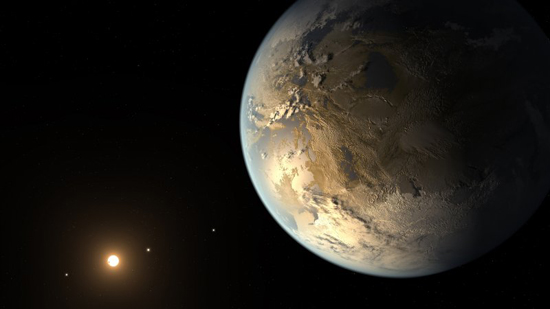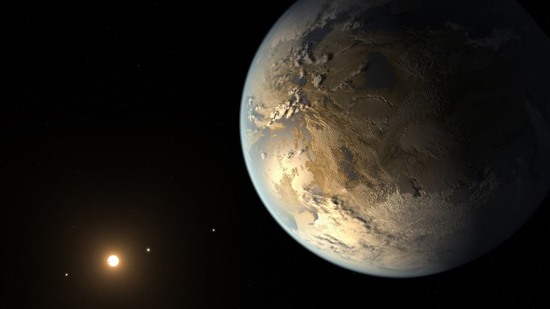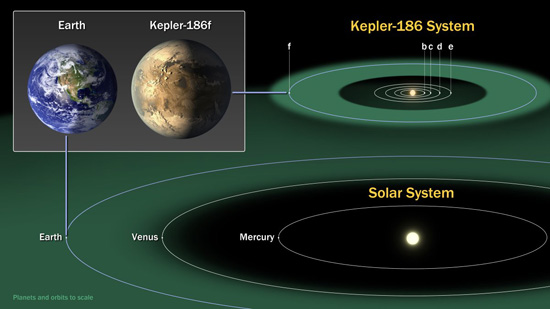NASA discovers Earth-sized planet in habitable zone

A free daily email with the biggest news stories of the day – and the best features from TheWeek.com
You are now subscribed
Your newsletter sign-up was successful
It was only a matter of time.

[NASA Ames/SETI Institute/JPL-CalTech]
Today, researchers at NASA pinpointed the best candidate for life elsewhere in the universe: an Earth-sized planet — Kepler-186f, orbiting a dwarf star. The star, Kepler 18, is 6,500 lightyears from Earth in the constellation Cygnus.
The Week
Escape your echo chamber. Get the facts behind the news, plus analysis from multiple perspectives.

Sign up for The Week's Free Newsletters
From our morning news briefing to a weekly Good News Newsletter, get the best of The Week delivered directly to your inbox.
From our morning news briefing to a weekly Good News Newsletter, get the best of The Week delivered directly to your inbox.
The planet is closer to its star than Earth is to the Sun, but because Kepler 186 is a smaller star, the habitable zone — where water on its surface would be liquid — is closer in.

[NASA Ames/SETI Institute/JPL-CalTech]
Scientists don't yet know its composition, and so can't answer key questions like whether its surface is rocky, or whether it possesses liquid water— and, of course, the big question of whether or not it harbors any form of life.
This is likely to be the first of many. The planet was discovered using the Kepler space telescope, launched in 2009 with the specific aim of seeking out extrasolar planets. Kepler has found dozens of exoplanets, most of them gaseous giants like Jupiter, Saturn and Uranus. Large planets — particularly ones very close to their star — are easier to identify, because of the larger gravitational and dimming effects they have on their stars' light emissions. Smaller Earth-sized planets — and particularly ones relatively further away from their star, like Earth — have smaller effects, making them harder for scientists to detect.
A free daily email with the biggest news stories of the day – and the best features from TheWeek.com
So this is a pretty historic day in the history of astronomy, and the history of human civilization. Whether or not the planet contains life at present, at the very least that we have detected a good candidate outside our solar system to visit, and maybe one day colonize.
John Aziz is the economics and business correspondent at TheWeek.com. He is also an associate editor at Pieria.co.uk. Previously his work has appeared on Business Insider, Zero Hedge, and Noahpinion.
-
 The ‘ravenous’ demand for Cornish minerals
The ‘ravenous’ demand for Cornish mineralsUnder the Radar Growing need for critical minerals to power tech has intensified ‘appetite’ for lithium, which could be a ‘huge boon’ for local economy
-
 Why are election experts taking Trump’s midterm threats seriously?
Why are election experts taking Trump’s midterm threats seriously?IN THE SPOTLIGHT As the president muses about polling place deployments and a centralized electoral system aimed at one-party control, lawmakers are taking this administration at its word
-
 ‘Restaurateurs have become millionaires’
‘Restaurateurs have become millionaires’Instant Opinion Opinion, comment and editorials of the day
-
 ‘One Battle After Another’ wins Critics Choice honors
‘One Battle After Another’ wins Critics Choice honorsSpeed Read Paul Thomas Anderson’s latest film, which stars Leonardo DiCaprio, won best picture at the 31st Critics Choice Awards
-
 Son arrested over killing of Rob and Michele Reiner
Son arrested over killing of Rob and Michele ReinerSpeed Read Nick, the 32-year-old son of Hollywood director Rob Reiner, has been booked for the murder of his parents
-
 Rob Reiner, wife dead in ‘apparent homicide’
Rob Reiner, wife dead in ‘apparent homicide’speed read The Reiners, found in their Los Angeles home, ‘had injuries consistent with being stabbed’
-
 Hungary’s Krasznahorkai wins Nobel for literature
Hungary’s Krasznahorkai wins Nobel for literatureSpeed Read László Krasznahorkai is the author of acclaimed novels like ‘The Melancholy of Resistance’ and ‘Satantango’
-
 Primatologist Jane Goodall dies at 91
Primatologist Jane Goodall dies at 91Speed Read She rose to fame following her groundbreaking field research with chimpanzees
-
 Florida erases rainbow crosswalk at Pulse nightclub
Florida erases rainbow crosswalk at Pulse nightclubSpeed Read The colorful crosswalk was outside the former LGBTQ nightclub where 49 people were killed in a 2016 shooting
-
 Trump says Smithsonian too focused on slavery's ills
Trump says Smithsonian too focused on slavery's illsSpeed Read The president would prefer the museum to highlight 'success,' 'brightness' and 'the future'
-
 Trump to host Kennedy Honors for Kiss, Stallone
Trump to host Kennedy Honors for Kiss, StalloneSpeed Read Actor Sylvester Stallone and the glam-rock band Kiss were among those named as this year's inductees